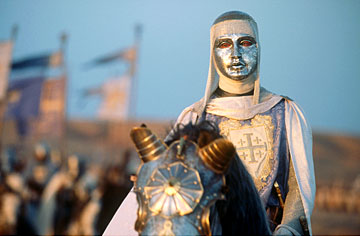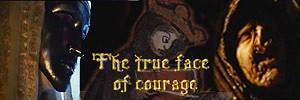


Kingdom of Heaven (2005)
(IMDb review)

Kingdom of Heaven (2005)
(IMDb review)
Ridley Scott's 21C Chivalric Revival Goes Off the Rails

The real Lion-Heart
Ridley Scott's Crusader epic is a film with a real hero - one of the most astonishingly courageous characters in mediæval history: a gallant young king who defeated Saladin several times in battle, proved himself an able diplomat, and struggled to prevent his kingdom falling into the hands of an heir he knew to be unreliable. But his greatest fight was against a disease which slowly decayed his body even as he lived, and killed him in his 24th year.
Baldwin IV, the 'Leper King' of the Latin Kingdom of Jerusalem, is the real 'Lion-Heart' of the Crusades. He was diagnosed with Hansen's Disease in childhood, king at 13, and dead before he turned 24. He nevertheless served as an active military commander and skilled political negotiator. Despite a crippled right arm, he learned to be a superb horseman. As his disease advanced into the lepromatous form, he lost the use of both hands and feet; he lost his eyesight and his nose. In his last years, disfigured, blind and crippled, he went on military campaigns in a litter. His biographer, Bernard Hamilton, writes: "Few rulers have remained executive heads of state when handicapped by such severe physical disabilities or sacrificed themselves more totally to the needs of their people." Heroism is a concept cheapened by over-use in our pop-celebrity culture, but Baldwin was the genuine article.
Problem with the film: Baldwin is only a supporting character, and is portrayed as peace-and-love hippie, who wants peace and understanding with Saladin, instead of the tough young Angevin warrior-king he was. (He was Henry II's first cousin.) He wears serene silver masks and flowing robes (part-Arabic, part-Paul Poiret) that make him look like a wingless angel. His disabilities are downplayed. By 1184, when the film begins, he was already blind and crippled: in the film, he can see, walk and ride, although his hands are damaged. Only when he is lying in state do we see his face, ravaged by advanced Hansen's Disease - noseless, lipless, distorted.
A far more serious problem with the film – which looks beautiful – is its wilfully anachronistic ethos and reliance on outdated historiography. Ridley Scott follows in the footsteps of his namesake Walter in trying to recast the chivalric ideal for his own time. Both Scotts imbue their sympathetic main characters with the values and viewpoints of their own eras: Sir Walter's mediæval heroes - Wilfred of Ivanhoe, Sir Kenneth of the Leopard, & c. - are essentially early 19C Protestant gentlemen, Mr Darcy in chainmail; Ridley's 21C decent humanists who abhor fanaticism of all kinds. Indeed, Sir Ridley admitted in an interview that his version of Balian of Ibelin is "an agnostic" like himself. But how can you make a film about the Latin Kingdom of Jerusalem without having characters rooted in 12C Catholicism? A Knight Hospitaller (a "guardian angel", according to Scott!) openly says he sets "little store" by organised religion: then why is he a monk? None of the 'good' characters are mediæval Catholics in mind-set or practice, nor do they seem to believe that the kingdom they are defending deserves to exist: why don't they just go home at the start of the film? The tone is essentially anti-Frankish, derived from Runciman (whose sympathies were openly Byzantinist) and Payne, overlaid with a lot of present-day post-imperial guilt-tripping. Monahan and Scott have ignored more recent historiography, such as Bernard Hamilton's The Leper King & His Heirs, and works by Benjamin Kedar, Jonathan Riley-Smith, Peter Edbury and others.
Time and again, the film emphasises the importance of a knightly oath, from the dying Godfrey's knighting of his son to Balian's knighting of commoners in Jerusalem:
Be without fear in the face of your enemies;
Be brave and upright, that God may love thee;
Speak the truth always, even if it leads to your death;
Safeguard the helpless and do no wrong:
That is your oath.
This strikes me as more Victorian than mediæval. Ridley Scott has said:
This may make me sound like a Boy Scout, but a little bit of Boy Scout would be very useful today. Chivalry is just good behaviour; it's quite simple, really, yet we don't seem to be able to apply it.
Just as Walter Scott led the 19C's chivalric revival, re-inventing mediaeval knightly ideals for the 19C Protestant bourgeois, Ridley Scott and William Monahan seem to be wishing to revive chivalry for a culturally and socially more diverse public, male and female, of all classes, who question organised religions and power structures. However laudable in contemporary terms, this creates problematic anachronisms in the film, in which characters openly express opinions which could have got them burned for heresy, and suffer bouts of very un-12C nihilism. It also makes one wonder why a film-maker should wish to make a film about the Latin Kingdom, if he is not prepared to enter the imaginative world of its people.
The film focuses on a completely fictionalised version of Balian of Ibelin, here portrayed as an alarmingly multi-talented young Occitan Gary-Stu blacksmith and wright, the illegitimate son of a knight, instead of an established middle-aged poulain baron with court connections (his brother was briefly the King's stepfather, and his wife, Maria Komnene, the King's stepmother). This pseudo-Balian (Orlando Bloom) is the weak link in the film. The first act of the film depicts him leaving his village after killing his half-brother, a priest, and bonding with his long-lost father, who soon dies. Then he sails from Messina to Outremer, is shipwrecked, and helped on his way to Jerusalem by a chivalrous young Saracen (Alexander Siddig). So far, so fictional. This seems to be because Scott had a long-cherished generic project about a peasant boy becoming a knight, which was grafted on to Monahan's more historically-based narrative.
Then the real people start to appear, which should be more interesting: but they have all been changed to varying degrees. Princess Sibylla is pseudo-Balian's flighty and unstable love-interest, and depicted as alienated from her husband - to whom she was actually devoted. She is incorrectly depicted as regent for her son, Baldwin of Montferrat, and is depicted as poisoning him because she fears he, too, is a leper. This is sheer melodramatic tosh, but the film-makers believe it somehow adds "depth" to her character! Scott also seems to have convinced himself that she was accused of killing her son, and that he had leprosy. Neither is true. Guy de Lusignan is thoroughly demonised (he was more easily-led and out of his depth than evil). It actually disturbed me to see him getting the kind of on-screen treatment which Conrad usually receives. Patriarch Eraclius is depicted as a corrupt coward, according to the portrayal in the Old French Continuation, as amplified by Runciman, and without reference to the more recent work on him by Kedar, which has brought this resourceful and learned man to life in more balanced fashion. Saladin is regal, tough and shrewd, but his imperial ambitions are given a far easier ride than those of the Franks. Monahan invents a scene in which his sister is killed by Reynaud de Châtillon, to justify his attack on the kingdom: never mind that he had been expanding his power from Aleppo to cairo by various means, and that Outremer was all that remained to be conquered. Reynaud had been attacking caravans, but Saladin set extra guards on the one in which his sister and nephew were travelling, and they came to no harm.
Raymond of Tripoli (here renamed Count of Tiberias - the estate of his wife Eschiva - so that viewers don't get confused with Tripoli in Libya!): Jeremy Irons looks just as I imagine the real Raymond: gaunt, grizzled, battle-scarred. Unfortunately, the script does not make the most of him. He is not depicted as prince of an independent state, but as a functionary ('Marshal' of Jerusalem, a role which the film seems to confuse with Constable), and is made to come out with lines about being disillusioned with fighting for land and wealth, not God. Raymond had been born in Outremer, had a claim to the throne, and was a major power-broker. He died a broken man after Hattin, but he was far from disillusioned and defeatist beforehand. Instead of depicting him and Balian fighting at Hattin, and escaping to Tyre (after which Raymond returned to Tripoli, where he died from pleurisy), the script has him deciding to retire to Cyprus (then still in Byzantine hands). From the commentary, it is clear that Scott has confused him with Guy, as he insists that this is what he did, and that he died there several years later!
Gérard de Ridefort, surely the obvious villain, is reduced to a minor role, yet, bizarrely, Guy and Reynaud (both family men) are badged as 'Templars'. There is also a strange scene early on, in which some Templars are hanged on Baldwin's orders for breaking the truce. This is a twisting of an incident which happened in Amaury I's reign, c. 1166, when he hanged a dozen Templars (highly questionably legally, as they were clergy) for surrendering a cave-fortress in Oultrejourdain when he was on his way to relieve them (i.e., for what he regarded as cowardice). Baldwin IV fought alongside the Templars in many battles. While many people had difficulties with Gérard de Ridefort as Grand Master, the film misrepresents the relationship between the king and an order which played a significant role in the kingdom's defence.
The most successful parts of the film are those which focus on the semi-recognisable characters: the invented romance is tedious, as is pseudo-Balian's journey of self-discovery. His refusal, despite his affair with Sibylla, to agree to her husband's death, appears selfish and weak instead of a guilt-laden refusal to compound adultery with killing. The omission of the battle of Hattin is disappointing. However, we should, perhps, be grateful that we were spared some of the scenes originally scripted: Raymond of Tripoli refusing the throne because he's secretly a Muslim, Guy stabbing Humphrey of Toron to death, and pseudo-Balian killing Guy in a climactic trial-by-combat (?!!!!) I'm sure that a dashing, 45-ish blond is leaning on the walls of Tyre and observing sardonically in Occitan, "Well, that would have made my life a lot easier...!" In fact, I shouldn't be at all surprised if the scriptwriter's keyboard were secretly possessed by the mischievous ghost of Conrad of Montferrat to invent those bits of plotting... Humphrey and Guy dying violently in 1187? He'd love that!

Back to
TOP
